五年级六个单元英语知识点归纳总结
小学五年级英语知识点归纳

小学五年级英语知识点归纳第一单元知识点一、关键词:domorningexercises晨练,做早操eatbreakfast吃早饭haveenglishclass上英语课eatdinner吃晚饭playsports进行体育活动eatlunch吃午饭climbmountains爬山goshopping购物,买东西playthepiano弹钢琴visitgrandparents看望(外)祖父母gohiking去远足二、主要句子:whendoyoueatdinner?你什么时候吃晚饭?晚上7点吃晚饭。
我晚上七点吃晚饭。
你什么时候起床?你什么时候起床?我通常在中午12点起床。
我通常中午12点起床。
你在周末干什么?你周末做什么?usuallyiwatchtvandgoshopping.我通常看电视和购物。
sometimesivisitmygrandparents.有时候我去看望我的外祖父母。
看足球。
我经常踢足球。
有时去远足。
有时我去远足。
3、同义词eatbreakfast―havebreakfast,eatlunch―havelunch,eatdinner―havedinner,playsports―dosports,u sually―often复数形式:policeman―policemenpolicewoman―policewomen现在分词:tell―telling第三人称单数:say―says你是做什么的?你是做什么的?四、表示频度的副词:always总是,一直;usually通常,常常;often经常;sometimes有时候五、以复数形式出现的词组:visitgrandparentsplanttrees六、当一个介词后面跟一个表示时间的词时,它的意思是在某一年、月、季节和时间(上午、下午和晚上);在一周中的某一天以及特定的时间和分钟七、too和either的用法区别:too和either都是“也”的意思,但too用于肯定句,either用于否定句。
五年级下册英语六个单元的,知识

五年级下册英语六个单元的,知识
以下是五年级下册英语六个单元的知识点总结:
1. 第一单元:重点词汇包括clock(钟)、o'clock(整点)、morni ng(早上)、afternoon(下午)、evening(晚上)等。
本单元主要学习时间表达和日常活动。
2. 第二单元:重点词汇有动物名称,如:cat(猫)、dog(狗)、p anda(熊猫)等,以及描述动物特征的形容词。
本单元主要学习动物及其特点。
3. 第三单元:重点词汇包括水果名称,如:apple(苹果)、orange (橙子)、banana(香蕉)等。
本单元主要学习水果名称和喜好。
4. 第四单元:重点词汇有家庭成员称呼,如:father(父亲)、mot her(母亲)、brother(兄弟)、sister(姐妹)等。
本单元主要学习家庭关系和称呼。
5. 第五单元:重点词汇包括颜色,如:red(红色)、blue(蓝色)、green(绿色)等。
本单元主要学习颜色及其表达。
6. 第六单元:重点词汇有天气词汇,如:sunny(晴朗的)、rainy (下雨的)、windy(刮风的)等。
本单元主要学习天气描述和日常活动安排。
每个单元的知识点均围绕重点词汇展开,通过学习这些词汇,学生可以提高英语听说读写能力。
请注意,这些知识点仅供参考,具体教学内容可能因教材版本和教学计划而有所不同。
PEP小学英语五年级下册各单元知识重点总结
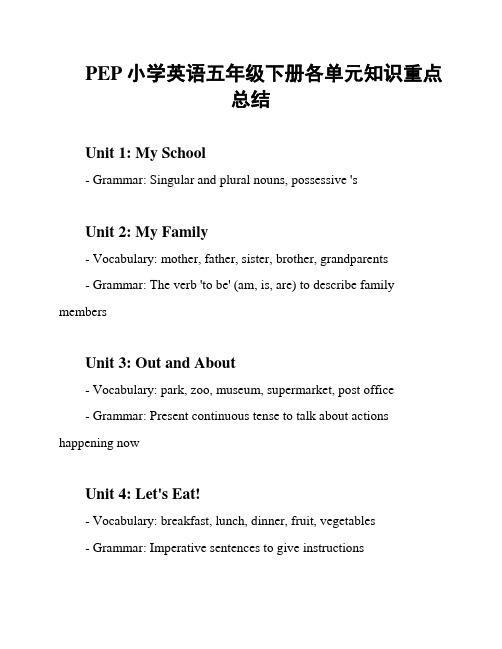
PEP小学英语五年级下册各单元知识重点总结Unit 1: My School- Grammar: Singular and plural nouns, possessive 'sUnit 2: My Family- Vocabulary: mother, father, sister, brother, grandparents- Grammar: The verb 'to be' (am, is, are) to describe family membersUnit 3: Out and About- Vocabulary: park, zoo, museum, supermarket, post office- Grammar: Present continuous tense to talk about actions happening nowUnit 4: Let's Eat!- Vocabulary: breakfast, lunch, dinner, fruit, vegetables- Grammar: Imperative sentences to give instructionsUnit 5: At the Farm- Vocabulary: farmer, barn, cow, pig, chicken- Grammar: There is/There are to talk about existenceUnit 6: Our Town- Vocabulary: street, hospital, police station, fire station, city- Grammar: Prepositions of place (in, on, under, behind, next to)Unit 7: Weather Report- Vocabulary: sunny, cloudy, rainy, snowy, windy- Grammar: Adjectives to describe weatherUnit 8: Fun with Friends- Vocabulary: play, sing, dance, swim, draw- Grammar: Simple present tense to talk about daily activitiesUnit 9: In the Ocean- Vocabulary: fish, dolphin, shark, octopus, seahorse- Grammar: Wh- questions using 'What' and 'Where'Unit 10: Happy Holidays- Vocabulary: Christmas, Easter, Halloween, New Year's Day, Thanksgiving- Grammar: Use of can for ability。
五年级英语知识点总结

五年级英语知识点总结一、词汇积累1. 基础词汇- 学校科目:Math(数学)、Science(科学)、History(历史)、Art(艺术)- 常见动物:Dog(狗)、Cat(猫)、Bird(鸟)、Fish(鱼)- 家庭成员:Mother(母亲)、Father(父亲)、Sister(姐妹)、Brother(兄弟)- 职业:Teacher(教师)、Doctor(医生)、Nurse(护士)、Policeman(警察)- 常见颜色:Red(红色)、Blue(蓝色)、Green(绿色)、Yellow(黄色)- 常见食物:Apple(苹果)、Banana(香蕉)、Chicken(鸡肉)、Rice(米饭)2. 扩展词汇- 学校活动:Reading Club(阅读俱乐部)、Sports Day(运动会) - 节假日:Christmas(圣诞节)、New Year's Day(元旦)- 自然现象:Rain(雨)、Snow(雪)、Thunderstorm(雷暴)- 交通工具:Bicycle(自行车)、Bus(公共汽车)、Train(火车)- 学校设施:Library(图书馆)、Gym(体育馆)、Cafeteria(食堂)二、语法要点1. 时态- 一般现在时:表示经常发生的动作或状态,如:I go to school every day.- 一般过去时:表示过去发生的动作或状态,如:He visited his grandparents last week.- 一般将来时:表示将来发生的动作或状态,如:They will go on a trip next month.2. 代词- 人称代词:I(我)、You(你)、He(他)、She(她)、It (它)、We(我们)、They(他们)- 物主代词:My(我的)、Your(你的)、His(他的)、Her(她的)、Its(它的)、Our(我们的)、Their(他们的)3. 句型结构- 肯定句:The sun rises in the east.- 否定句:The sun does not rise in the west.- 疑问句:Does the sun rise in the east? / The sun doesnot rise in the west, does it?4. 简单句和并列句- 简单句:She reads a book.(她读一本书。
小学五年级英语上册第六单元重点知识归纳
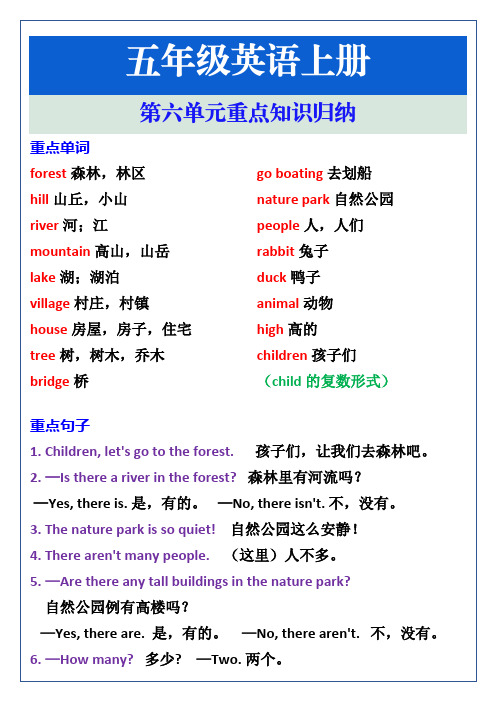
例:There is a nature park near the house.
There are many ducks on the lake.
3、some与any在肯定句、否定句及问句中的用法:
some+可数名词复数/不可数名词(用于肯定句中)
3. The nature park is so quiet!自然公园这么安静!
4. There aren't many people.(这里)人不多。
5.—Are there any tall buildings in the nature park?
自然公园例有高楼吗?
—Yes, there are.是,有的。—No, there aren't.不,没有。
6.—How many?多少?—Two.两个。
7. Robin is at Mr. Jones' house.罗宾在琼斯先生的房子里。
语音
字母组合ou在单词中的发音:[ au ]
例:house房屋,房子mouse老鼠sound声音,听起来count数数
提示:字母组合ow也有些发[ au ],例:cow奶牛how如何,怎样down向下
4、people人,人们(集体名词,明为单数,实为复数,词末不能加-s)
例:There are many people in the park.
重点作文
1、描写景物,如:看图作文(风景图)
思路导引
(1)开头:Look at the picture.
(2)中间:用There is/are…beside/in front of…句型描述图中所有的景物及其位置,注意要有明确的观察主线,即观察的顺序性与条理性。
五年级下册英语六个单元全部总结。

五年级下册英语六个单元全部总结。
1. Unit 1: Daily routines - This unit focuses on teaching students how to talk about their daily routines and activities. They learn to use the present simple tense to describe what they do every day. They also learn vocabulary related to daily activities, such as brushing teeth, eating breakfast, and going to school.2. Unit 2: Family and friends - In this unit, students learn vocabulary related to family members and friends. They also learn how to describe people's physical appearance and personality traits. They practice using possessive pronouns and adjectives to talk about their family and friends.3. Unit 3: Food and drinks - Students learn vocabulary related to different types of food and drinks. They practice describing likes and dislikes using the verb "like" and adjectives such as delicious, tasty, and healthy. They also learn about healthy eating habits and the importance of a balanced diet.4. Unit 4: Around town - This unit focuses on teaching students how to give and follow directions. They learn vocabulary related to places in a town, such as the post office, library, and supermarket. They practice using prepositions of place, such as on, in, and next to, to give directions and describe locations.5. Unit 5: Holidays and celebrations - Students learn about different holidays and celebrations from around the world. They learn vocabulary related to holidays and traditions, such as Christmas, Chinese New Year, and Halloween. They also learn about different customs and rituals associated with thesecelebrations.6. Unit 6: Animals and their habitats - In this unit, students learn vocabulary related to different animals and their habitats. They learn about different types of animals, such as mammals, birds, reptiles, and insects. They also learn about different habitats, such as forests, oceans, and deserts, and the importance of protecting and preserving animal habitats.Overall, these units cover a range of topics and themes in order to build students' vocabulary, grammar, and communication skills in English.。
五年级六个单元英语知识点归纳总结
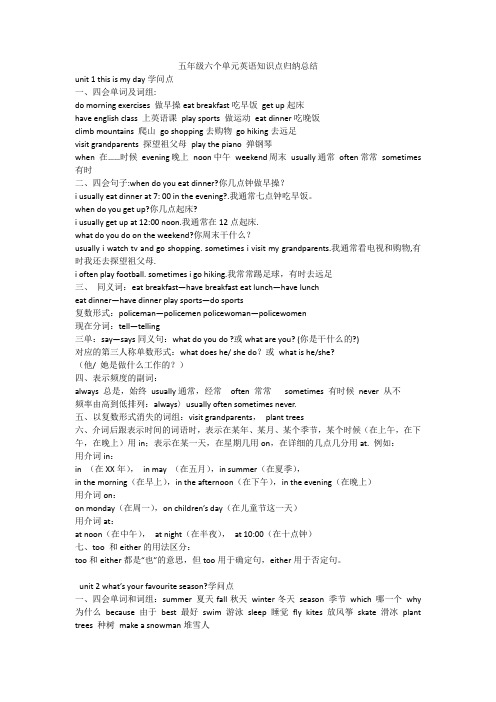
五年级六个单元英语知识点归纳总结unit 1 this is my day学问点一、四会单词及词组:do morning exercises 做早操eat breakfast吃早饭get up起床have english class 上英语课play sports 做运动eat dinner吃晚饭climb mountains 爬山go shopping去购物go hiking去远足visit grandparents 探望祖父母play the piano 弹钢琴when 在……时候evening晚上noon中午weekend周末usually通常often常常sometimes 有时二、四会句子:when do you eat dinner?你几点钟做早操?i usually eat dinner at 7: 00 in the evening?.我通常七点钟吃早饭。
when do you get up?你几点起床?i usually get up at 12:00 noon.我通常在12点起床.what do you do on the weekend?你周末干什么?usually i watch tv and go shopping. sometimes i visit my grandparents.我通常看电视和购物,有时我还去探望祖父母.i often play football. sometimes i go hiking.我常常踢足球,有时去远足三、同义词:eat breakfast—have breakfast eat lunch—have luncheat dinner—have dinner play sports—do sports复数形式:policeman—policemen policewoman—policewomen现在分词:tell—telling三单:say—says同义句:what do you do ?或what are you? (你是干什么的?)对应的第三人称单数形式:what does he/ she do?或what is he/she?(他/ 她是做什么工作的?)四、表示频度的副词:always 总是,始终usually通常,经常often 常常sometimes 有时候never 从不频率由高到低排列:always〉usually often sometimes never.五、以复数形式消失的词组:visit grandparents,plant trees六、介词后跟表示时间的词语时,表示在某年、某月、某个季节,某个时候(在上午,在下午,在晚上)用in;表示在某一天,在星期几用on,在详细的几点几分用at. 例如:用介词in:in (在XX年),in may (在五月),in summer(在夏季),in the morning(在早上),in the afternoon(在下午),in the evening(在晚上)用介词on:on monday(在周一),on children’s day(在儿童节这一天)用介词at:at noon(在中午),at night(在半夜),at 10:00(在十点钟)七、too 和either的用法区分:too和either都是“也”的意思,但too用于确定句,either用于否定句。
小学五年级英语知识点归纳

小学五年级英语知识点归纳小学五年级英语知识点归纳1.星期一到星期天首字母要大写。
Monday 星期一(Mon.) Tuesday 星期二(Tues.)Wednesday 星期三 (wed.) Thursday 星期四 (Thur.)Friday星期五(Fri.) Saturday 星期六 (Sat.)Sunday 星期天(Sun.)2.watch TV 看电视 do homework 家庭 read books 看书wash my clothes洗衣服 play football踢足球3.本单单元重点学习怎样问星期及怎样回答。
今天是星期几? What day is it today?今天是星期一。
It’s Monday.4.问星期的某天常干什么事及回答。
你星期六常干什么? What do you often do on Saturday?我常做家庭作业. I often do homework.你们星期三常上些什么课? What do you have on Wednesday?我们上语文、数学和英语. We have Chinese math and English.5. What about you? 那你呢? (用于来问别人同样的问题而又不重复前面的问句。
)6. John likes Mondays and Fridays, because he likes P.E.小学五年级英语知识点总结一、主要单词:do morning exercises 晨练,做早操 eat breakfast吃早饭have English class上英语课play sports进行体育活动eat dinner吃晚饭eat lunch吃午饭climb mountains 爬山go shopping购物,买东西 play the piano 弹钢琴visit grandparents 看望(外)祖父母go hiking去远足二、主要句子: When do you eat dinner?你什么时候吃晚饭?I eat dinner at 7:00 in the evening. 我晚上七点吃晚饭。
五年级下册英语六个单元的,知识
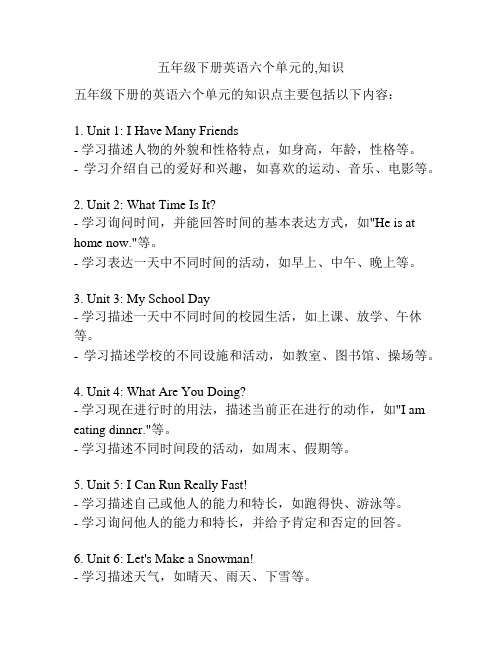
五年级下册英语六个单元的,知识
五年级下册的英语六个单元的知识点主要包括以下内容:
1. Unit 1: I Have Many Friends
- 学习描述人物的外貌和性格特点,如身高,年龄,性格等。
- 学习介绍自己的爱好和兴趣,如喜欢的运动、音乐、电影等。
2. Unit 2: What Time Is It?
- 学习询问时间,并能回答时间的基本表达方式,如"He is at home now."等。
- 学习表达一天中不同时间的活动,如早上、中午、晚上等。
3. Unit 3: My School Day
- 学习描述一天中不同时间的校园生活,如上课、放学、午休等。
- 学习描述学校的不同设施和活动,如教室、图书馆、操场等。
4. Unit 4: What Are You Doing?
- 学习现在进行时的用法,描述当前正在进行的动作,如"I am eating dinner."等。
- 学习描述不同时间段的活动,如周末、假期等。
5. Unit 5: I Can Run Really Fast!
- 学习描述自己或他人的能力和特长,如跑得快、游泳等。
- 学习询问他人的能力和特长,并给予肯定和否定的回答。
6. Unit 6: Let's Make a Snowman!
- 学习描述天气,如晴天、雨天、下雪等。
- 学习描述不同季节的活动和变化,如春天、夏天、秋天、冬天等。
以上是五年级下册英语六个单元的主要知识点概述,具体的知识点还包括词汇、语法和句型等。
五年级英语第六单元

五年级英语第六单元摘要:一、五年级英语第六单元的学习重点1.词汇和语法2.听说读写技能3.文化意识二、单元学习内容概述1.主题和话题2.课文和对话3.听力练习4.口语练习5.阅读理解6.写作练习三、教学方法和策略1.情境教学法2.任务型教学法3.合作学习四、学生学习建议1.课前预习2.课堂积极参与3.课后复习和练习五、单元评估与反馈1.单元测试2.学习成果展示3.教学反馈与调整正文:【提纲】一、五年级英语第六单元的学习重点在五年级英语第六单元中,学生将进一步学习以下方面的知识和技能:1.词汇和语法:掌握本单元的新单词和短语,熟练运用所学的语法规则进行句子构建。
2.听说读写技能:通过听说读写的综合训练,提高学生在实际场景中使用英语的能力。
3.文化意识:了解不同国家和地区的文化特点,培养学生的跨文化交际能力。
【提纲】二、单元学习内容概述本单元的学习内容围绕以下主题和话题展开:1.主题和话题:本单元的主题为“My Hobbies”,学生将学习各种兴趣爱好的表达方式,以及如何与他人分享自己的兴趣爱好。
2.课文和对话:通过课文和对话的学习,学生将掌握与兴趣爱好相关的词汇、短语和句型。
3.听力练习:学生需通过听力练习,理解并模仿课文和对话中的语言表达。
4.口语练习:学生将运用所学的词汇和句型进行角色扮演,模拟实际生活中的对话场景。
5.阅读理解:学生需阅读相关文章,理解文章内容,提高阅读速度和理解能力。
6.写作练习:学生需根据要求,运用所学的词汇和句型进行书面表达。
【提纲】三、教学方法和策略为了帮助学生更好地学习本单元内容,教师将采用以下教学方法和策略:1.情境教学法:通过设置真实或模拟的真实情境,让学生在情境中进行语言实践,提高语言运用能力。
2.任务型教学法:设置具有实际意义的任务,让学生在完成任务的过程中,自然地运用所学语言知识和技能。
3.合作学习:组织学生进行小组合作,互相帮助、互相学习,提高学生的团队协作能力。
五年级上册英语六个单元复习汇总

U1 What’s he like?四会单词:必须会背会默old 老的young 年轻的funny 滑稽的kind 和蔼的strict 要求严格的(书写错误率高)polite 有礼貌的,客气的hard-working 工作努力的(连字符不能省)helpful 有用的,愿意帮忙的clever 聪明的shy 害羞的出现在课本上的两个单词friendly 友好的quiet 安静的重点句子:(会背会默)-Who’s your English teacher?你的英语老师是谁?-Miss White.-Is she kind? 她和蔼吗?-Yes, she is./ No,she isn’t.是的,她很和蔼。
/不,她不和蔼。
What’s she like?他怎么样?She’s kind. 他很和蔼各学科老师的常用写法:英语老师English teacher数学老师maths teacher音乐老师music teacher美术老师art teacher科学老师science teacher校长the head teacher以下句子要求熟读,并会翻译。
He can speak Chinese and English. 他会说汉语和英语。
He makes me finish my homework. 他让我完成我的家庭作业。
He is very helpful at home.他在家里很爱帮助人。
He is a good football player.他是一个好的足球运动员。
本单元的几对反义词old youngkind stricttall shortthin strongMr Mrs Miss Ms四个词的区别:Mr 泛指所有的男士Mrs 已婚女士Ms 婚姻状况不明的女士Miss 未婚女士(只有Mr代表男士,其他三个都是女士)谚语(了解即可)You can’t judge a book by its cover.不能以貌取人。
部编英语五年级下册总复习各单元课文知识点归纳汇总(1)

部编英语五年级下册总复习各单元课文知识点归纳汇总(1)本文档旨在对部编英语五年级下册的各单元课文知识点进行归纳和汇总,以供复参考。
以下是各单元的知识点概述:第一单元:Shall we celebrate?- 本单元主要介绍了不同节日的庆祝方式和表达祝福的方式。
学生需要学会用英语表达自己参加节日庆祝、提出庆祝活动和表达祝福的能力。
第二单元:My family- 本单元以介绍家庭为主题,学生需要研究家庭成员的称呼,能够介绍自己的家庭以及问询别人的家庭情况。
第三单元:An old man and a hat- 本单元以故事《一个老人和一顶帽子》为主,旨在培养学生的阅读理解能力和语言表达能力,引导他们用简单、流畅的语言阅读并理解故事。
第四单元:Music Time- 本单元主要研究音乐的基本概念和表达方式,学生需要学会用英语表达自己对音乐的喜好和感受。
第五单元:My pet- 本单元以宠物为主题,学生需要研究描述自己宠物的外貌特征、性格以及与宠物的相处之道。
第六单元:Wild animals- 本单元主要介绍了各种野生动物,学生需要学会描述动物的外貌特征和性,以及人与动物的相处之道。
第七单元:At the zoo- 本单元以动物园为背景,学生需要学会用英语描述动物园的各种场景和动物。
第八单元:Going to the countryside- 本单元以乡村生活为主题,学生需要学会用英语描述乡村的风景、农作物种植、乡村生活等方面的内容。
第九单元:Why is the fire hot?- 本单元以“火”为话题,学生需要学会用英语描述火的特点、危害和灭火方法。
第十单元:At the amusement park- 本单元以游乐园为背景,学生需要学会用英语描述游乐设施、游乐活动以及和朋友一起游玩的情景。
以上是部编英语五年级下册各单元课文知识点的概括和归纳,希望对同学们的复有所帮助。
五年级英语上册第6单元知识归纳
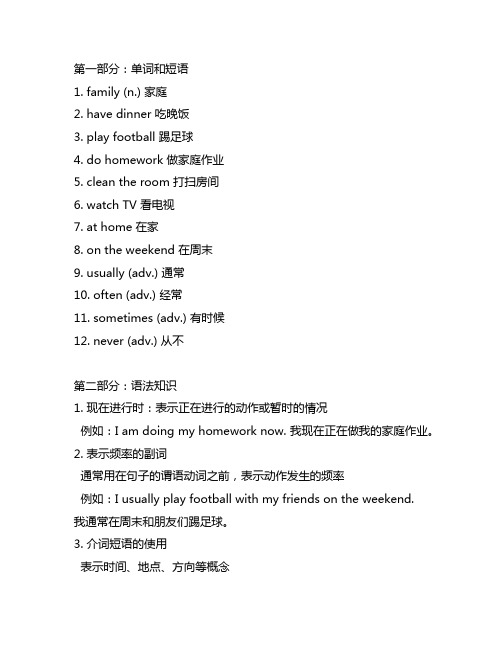
第一部分:单词和短语1. family (n.) 家庭2. have dinner 吃晚饭3. play football 踢足球4. do homework 做家庭作业5. clean the room 打扫房间6. watch TV 看电视7. at home 在家8. on the weekend 在周末9. usually (adv.) 通常10. often (adv.) 经常11. sometimes (adv.) 有时候12. never (adv.) 从不第二部分:语法知识1. 现在进行时:表示正在进行的动作或暂时的情况例如:I am doing my homework now. 我现在正在做我的家庭作业。
2. 表示频率的副词通常用在句子的谓语动词之前,表示动作发生的频率例如:I usually play football with my friends on the weekend.我通常在周末和朋友们踢足球。
3. 介词短语的使用表示时间、地点、方向等概念例如:at home 在家,on the weekend 在周末第三部分:对话A: What do you usually do at home?B: I usually do my homework and help my mom clean the room. A: What about on the weekend?B: I often play football with my friends on the weekend. How about you?A: I never play football. I usually watch TV at home.B: That sounds fun. Do you want to play football with us this weekend?A: Sure, I’d love to!第四部分:阅读理解My FamilyI have a happy family. There are four people in my family -- my father, my mother, my sister, and me. My father is a teacher. He teaches Chinese. He is very kind. My mother is a nurse. She works in a hospital. She is very helpful. My sister is a student. She is in Grade 3. She is very smart. We have dinner together every day. We often play football in the park on the weekend. I love my family. What about your family?第五部分:写作练习以“My Family”为题,写一篇短文描述自己的家庭情况,包括家庭成员的职业、特点、日常活动等内容。
知识点总结(Unit4-6)(知识清单)人教精通版英语五年级上册
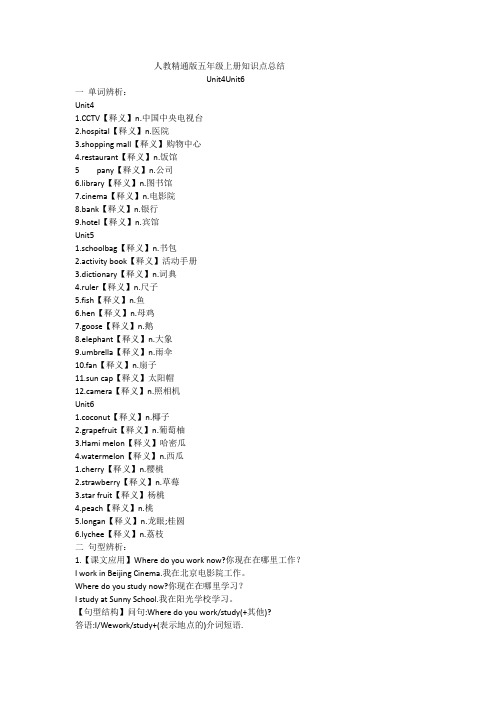
人教精通版五年级上册知识点总结Unit4Unit6一单词辨析:Unit4TV【释义】n.中国中央电视台2.hospital【释义】n.医院3.shopping mall【释义】购物中心4.restaurant【释义】n.饭馆5 pany【释义】n.公司6.library【释义】n.图书馆7.cinema【释义】n.电影院8.bank【释义】n.银行9.hotel【释义】n.宾馆Unit51.schoolbag【释义】n.书包2.activity book【释义】活动手册3.dictionary【释义】n.词典4.ruler【释义】n.尺子5.fish【释义】n.鱼6.hen【释义】n.母鸡7.goose【释义】n.鹅8.elephant【释义】n.大象9.umbrella【释义】n.雨伞10.fan【释义】n.扇子11.sun cap【释义】太阳帽12.camera【释义】n.照相机Unit61.coconut【释义】n.椰子2.grapefruit【释义】n.葡萄柚3.Hami melon【释义】哈密瓜4.watermelon【释义】n.西瓜1.cherry【释义】n.樱桃2.strawberry【释义】n.草莓3.star fruit【释义】杨桃4.peach【释义】n.桃5.longan【释义】n.龙眼;桂圆6.lychee【释义】n.荔枝二句型辨析:1.【课文应用】Where do you work now?你现在在哪里工作?I work in Beijing Cinema.我在北京电影院工作。
Where do you study now?你现在在哪里学习?I study at Sunny School.我在阳光学校学习。
【句型结构】问句:Where do you work/study(+其他)?答语:I/Wework/study+(表示地点的)介词短语.【重点解析】where意为“哪里”,用来对地点进行提问。
五年级英语第六单元
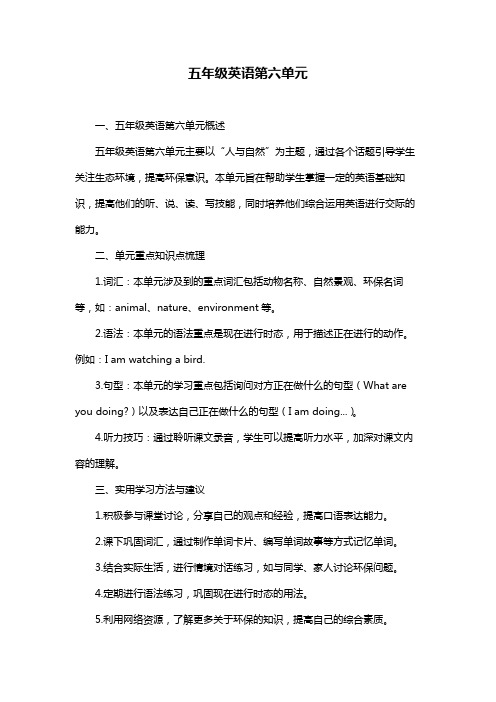
五年级英语第六单元一、五年级英语第六单元概述五年级英语第六单元主要以“人与自然”为主题,通过各个话题引导学生关注生态环境,提高环保意识。
本单元旨在帮助学生掌握一定的英语基础知识,提高他们的听、说、读、写技能,同时培养他们综合运用英语进行交际的能力。
二、单元重点知识点梳理1.词汇:本单元涉及到的重点词汇包括动物名称、自然景观、环保名词等,如:animal、nature、environment等。
2.语法:本单元的语法重点是现在进行时态,用于描述正在进行的动作。
例如:I am watching a bird.3.句型:本单元的学习重点包括询问对方正在做什么的句型(What are you doing?)以及表达自己正在做什么的句型(I am doing...)。
4.听力技巧:通过聆听课文录音,学生可以提高听力水平,加深对课文内容的理解。
三、实用学习方法与建议1.积极参与课堂讨论,分享自己的观点和经验,提高口语表达能力。
2.课下巩固词汇,通过制作单词卡片、编写单词故事等方式记忆单词。
3.结合实际生活,进行情境对话练习,如与同学、家人讨论环保问题。
4.定期进行语法练习,巩固现在进行时态的用法。
5.利用网络资源,了解更多关于环保的知识,提高自己的综合素质。
四、课后练习与拓展资源1.完成课本后的练习题,检查自己对单元知识的掌握程度。
2.制作关于环保的宣传海报,提高同学们的环保意识。
3.参加学校或社区的环保活动,将所学知识运用到实践中。
4.观看有关环保的英语短片,拓展自己的视野。
5.撰写一篇关于环保的英语作文,提高写作能力。
通过以上学习,相信同学们能够更好地掌握五年级英语第六单元的知识,提高自己的英语水平。
新版PEP五年级上册英语五六单元复习知识点

Unit 5 There is a big bed一、单词房间里的陈设:clock时钟plant植物bottle瓶子water bottle水瓶 bike自行车photo相片表位置的词:in front of在…前面between在…之前above在…上面 beside在旁边behind在…后面其他:there表示存在或发生lots of = a lot of很多,大量flower花 live 居住move into搬进 dirty肮脏的 nature自然界in the nature park在自然公园里everywhere到处,到处二、句型1.What a nice photo!(感慨句:好美的照片!)2.What's in the room? (房间里面有什么?)There is a bed in the room.3.There are so many pictures! (有如此多的图片啊!)4.My father can draw very well.(特别棒,特别好)5.There are lots of(很多) flowers in the house.6.I want to go home.(want to 想要)7.We are later for school.( be later for 迟到)三、发音字母组合ai 与ay 在单词中的发音ai / ei / rain rainy rainbow paint waitay / ei / say way birthday day always today may四、语法①"There be" and "have/has"表存在,“有”。
There be句型包括there is与there are。
There is a …后面跟名词单数,表示一个。
There are 后面跟名词复数,表示多个。
五年级英语各单元知识点总结

Unit 1: Around the WorldIn this unit, students learn about different countries and cultures around the world. They learn about greetings, nationalities, languages, and traditional customs. They also learn about some famous landmarks.Unit 2: Daily RoutinesUnit 3: Hobbies and InterestsIn this unit, students learn how to talk about their hobbies and interests. They learn new vocabulary related to different hobbies such as playing sports, collecting things, and playing musical instruments. They also learn how to express their likes and dislikes.Unit 4: Festivals and CelebrationsIn this unit, students learn about different festivals and celebrations around the world. They learn about the traditions and customs of various festivals such as Christmas, Halloween, and Chinese New Year. They also learn about the importance of these festivals and how people celebrate them.Unit 5: Healthy LivingIn this unit, students learn about the importance of a healthy lifestyle. They learn about different types of food and drinks and how to talk about their preferences and choices. Theyalso learn about the benefits of exercise and the importance of staying active.Unit 6: My Family and FriendsIn this unit, students learn how to talk about theirfamilies and friends. They learn new vocabulary related tofamily members and how to describe their relationships. They also learn how to talk about their friends and describe their personalities.Unit 7: At the SupermarketUnit 8: In the CityIn this unit, students learn how to talk about places in the city. They learn new vocabulary related to different locations such as the park, the library, and the post office. They also learn how to ask for and give directions to these places.Unit 9: Our WorldIn this unit, students learn about the environment and how to protect it. They learn new vocabulary related to nature and different environmental issues. They also learn how to talk about actions they can take to help the environment, such as recycling and saving energy.Unit 10: ReviewThis unit serves as a review of all the topics and vocabulary learned throughout the year. Students revise and practice their skills in speaking, listening, reading, and writing. They also review grammar structures and sentence patterns.。
五年级六个单元英语知识点归纳总结

五年级六个单元英语知识点归纳总结第一单元:我的家人1. 家庭成员:在这个单元中,我们学习了家庭成员的英文表达。
我们可以用下面的表达方式来介绍我们的家人:•爸爸:father•妈妈:mother•姐姐:sister•哥哥:brother•爷爷:grandfather•奶奶:grandmother要记住这些词汇,我们可以通过制作家庭成员的图片卡片或者进行角色扮演来帮助记忆。
2. 家人的特征:除了学习家庭成员的名称,我们还学习了一些形容词来描述家人的特征:•聪明的:smart•善良的:kind•友好的:friendly•幽默的:funny•强壮的:strong•漂亮的:pretty我们可以用这些形容词来描述我们的家人是什么样子的,例如:我的爸爸很聪明,我的姐姐很漂亮等。
3. 家庭活动:在这个单元中,我们还学习了一些家庭活动的词汇。
下面是一些例子:•吃早餐:have breakfast•做作业:do homework•看电视:watch TV•唱歌:sing songs•玩游戏:play games•散步:take a walk这些词汇可以帮助我们描述我们的日常生活和家庭活动。
第二单元:食物与饮料1. 食物名称:在这个单元中,我们学习了一些常见的食物和饮料的英文名称。
下面是一些例子:•苹果:apple•香蕉:banana•橙子:orange•面包:bread•牛奶:milk•蔬菜:vegetables要记住这些词汇,我们可以制作食物和饮料的图片卡片,或者在超市或者餐厅时尝试用英语来点菜。
2. 饮食习惯:除了学习食物和饮料的名称,我们还学习了一些关于饮食习惯的表达方式。
下面是几个例子:•早餐:breakfast•午餐:lunch•晚餐:dinner•零食:snacks•健康食品:healthy food•垃圾食品:junk food我们可以使用这些词汇来描述我们的饮食习惯以及别人的饮食习惯。
3. 烹饪动词:在这个单元中,我们还学习了一些烹饪动词。
- 1、下载文档前请自行甄别文档内容的完整性,平台不提供额外的编辑、内容补充、找答案等附加服务。
- 2、"仅部分预览"的文档,不可在线预览部分如存在完整性等问题,可反馈申请退款(可完整预览的文档不适用该条件!)。
- 3、如文档侵犯您的权益,请联系客服反馈,我们会尽快为您处理(人工客服工作时间:9:00-18:30)。
五年级六个单元英语知识点归纳总结Unit1Thisismyday知识点一、四会单词及词组:domorningexercises做早操eatbreakfast吃早饭getup起床haveEnglishclass上英语课playsports做运动eatdinner吃晚饭climbmountains爬山goshopping去购物gohiking去远足visitgrandparents看望祖父母playthepiano弹钢琴when在……时候evening晚上noon中午weekend周末usually通常often经常sometimes有时二、四会句子:whendoyoueatdinner?你几点钟做早操?Iusuallyeatdinnerat7:00intheevening?.我通常七点钟吃早饭。
whendoyougetup?你几点起床?Iusuallygetupat12:00noon.我通常在12点起床.whatdoyoudoontheweekend?你周末干什么?UsuallyIwatchTVandgoshopping.SometimesIvisitmygrand parents.我通常看电视和购物,有时我还去看望祖父母.Ioftenplayfootball.SometimesIgohiking.我经常踢足球,有时去远足三、同义词:eatbreakfast—havebreakfasteatlunch—haveluncheatdinner—havedinnerplaysports—dosports复数形式:policeman—policemenpolicewoman—policewomen现在分词:tell—telling三单:say—says同义句:whatdoyoudo?或whatareyou?对应的第三人称单数形式:whatdoeshe/shedo?或whatishe/she?(他/她是做什么工作的?)四、表示频度的副词:always总是,一直usually通常,常常often经常sometimes有时候never从不频率由高到低排列:always〉usuallyoftensometimesnever.五、以复数形式出现的词组:visitgrandparents,planttrees六、介词后跟表示时间的词语时,表示在某年、某月、某个季节,某个时候(在上午,在下午,在晚上)用in;表示在某一天,在星期几用on,在具体的几点几分用at.例如:用介词in:inXX(在XX年),inmay(在五月),insummer(在夏季),inthemorning(在早上),intheafternoon(在下午),intheevening(在晚上)用介词on:onmonday(在周一),onchildren’sDay(在儿童节这一天)用介词at:atnoon(在中午),atnight(在子夜),at10:00(在十点钟)七、too和either的用法区别:too和either都是“也”的意思,但too用于肯定句,either用于否定句。
Unit2what’syourfavouriteseason?知识点一、四会单词和词组:summer夏天fall秋天winter冬天season季节which哪一个why为什么because因为best 最好swim游泳sleep睡觉flykites放风筝skate滑冰planttrees种树makeasnowman堆雪人二、四会句子:whichseasondoyoulikebest?你最喜欢哪个季节?Ilikewinterbest.我最喜欢冬天。
Summerisgood,butfallismyfavouriteseason.夏天不错,但秋天是我最喜欢的季节。
whydoyoulikesummer?你喜欢夏天吗?BecauseIcanswiminthelake.因为我能在湖中游泳。
whydoyoulikewinter?你为什么喜欢冬天?BecauseIcansleepalongtime.因为我能长长地睡上一觉。
三、同义词:fall—autumn秋天三单:say—saysask—askscome——comes对应词:wakeup—sleepgotobed—getup同义句:what’syourfavouriteseason?(你最喜欢的季节是什么?)whichseasondoyoulikebest?(你最喜欢哪个季节?)四、playwith玩雪,playinthesnow在雪中玩。
如果在横线后面有the,则选择in,如果在横线后面没有the,则选择with.五、like后面不能直接跟动词。
如果需要跟动词或动词性词组时,则需like后面加to.如果不加to.就要把后面的动词变成相应的动名词形式.如:Iliketoswim===Ilikeswimming.(其中Ilikeswimming.强调游泳是爱好,而Iliketoswim是说明偶尔喜欢去游泳。
)六、当表示某地某个季节的天气情况时,要把季节放在前面,地点放在后面。
其结构为:what’stheweatherlikein 季节in地点?例如:what’stheweatherlikeinspringinBeijing?(北京春天的天气如何?)unit3mybirthday知识点一、四会单词january一月February二月march三月April四月may五月june六月july七月August八月September九月october十月November十一月December十二月birthday生日二、四会句子:whenisyourbirthday?你的生日在什么时候?It’sisinmay.我的生日在五月。
mybirthdayisinjune.UncleBill’sbirthdayisinjune,too.我的生日在六月.比尔叔叔的生日也在六月。
Isherbirthdayinjune?yes.她的生日在六月吗?是的。
what’sthedate?几月几日?june9th.六月九日三、主要知识点:、关于月份:(1)五月may,六月june,七月july,没有简写形式。
九月September的简写形式是前四个字母加点Sept. 其他八个月的简写形式是前三个字母加点。
(2)无论是完全形式还是简写形式,表示12个月的单词的第一个字母都要大写。
2、关于基数词变序数词。
一般情况下,直接在基数词后面加th.(one,two,three 除外)。
one—first,two—second,three—third.以ve结尾的基数词,变ve为f,再加th.如:five—fifth,twelve—twelfth.以t结尾的基数词,直接加h。
如eight—eighth.以不发音的字母e结尾的,丢掉不发音的字母e,再加th.如nine—ninth.以y结尾的整十数,在变为序数词时,将y变为ie再加th.如twenty—twentieth.20以上的两位数,变为序数词时,十位数不变,只将个位上的数变为序数词。
如:twenty-one----twenty-first, twenty-two—twenty-second,thirty-four—thirty-fourth.序数词的简写形式为表示该词的阿拉伯数字加上该单词的最后两个字母,最后两个字母要变成上标格式。
如:first—1st,second—2nd,third—3rd,fourth—4th.twentieth—20th.3.在回答whenisyourbirthday?这个问题时,如果只说明生日在几月份,在月份前用in.。
如mybirthdayisinjuly.如果要具体说明生日是在几月几日,则要把in去掉,直接用is,或者在is后加on。
如mybirthdayisjune9th.或mybirthdayisonjune9th.4.注意区分两个句子:whatdayisittoday?今天星期几?what’sthedatetoday?今天是几月几日?5.根据要求写单词:make---making.send---sending.6.句子:Howmanybirthdaysareinoctober?有几个人的生日在十月?Thereare3.(句子中注意birthdays要用复数形式)7.mybirthdayisinFebruary.——IsyourbirthdayinFebruary?8.Doesshehaveacomputer?她有计算机吗?当第三人称单数和句子中出现了does时,其他动词必须使用原型。
8、读序数词时,前面一定要加the.如october1st.读作octoberthefirst.但是写的时候不加the。
9、同义句:whohasabirthdayinoctober?==whosebirthdayisinoctober?第四单元知识点一、主要单词:drawpictures画画drawingpictures正在画画dothedishes洗碗碟doingthedishes正在洗碗碟cookdinner做饭cookingdinner 正在做饭readabook 读书readingabook正在读书answerthephone接电话answeringthephone 正在接电话listentomusic 听音乐listeningtomusic 正在听音乐washclothes 洗衣服washingclothes 正在洗衣服cleantheroom 打扫房间cleaningtheroom 正在打扫房间writealetter 写信writingaletter 正在写信writeane-mail 写电子邮件writingane-mail正在写电子邮件二、主要句子:.ThisisZhangPeng.(电话用语)我是张朋。
who’sthat?(电话用语)你是哪位?whatareyoudoing?你正在干什么? 2.I’mdoingthedishes.我正在洗碗碟。
I’mreadingabook。
我正在读书。
3.Grandpaiswritingaletter。
爷爷正在写信。
Brotherisdoinghomework.弟弟正在做作业。
4.momiscookingdinnerinthekitchen.妈妈正在厨房里做饭。
5.Dadiswritingane-mailinthestudy.爸爸正在书房里写电子邮件。
三、知识点:1、在电话中介绍自己时,可以用“It’s…”或者‘Thisis….’。
但是不能用“Iam…”或者“mynameis…”2.在电话中表另一个人接电话时,应该说:“canIspeakto…?”3、告诉别人接电话时,说:Thereisacallforyou.4、在接电话时请别人稍候说:Holdonplease.或者Pleaseholdon.5、动词变为现在分词(加ing)的规则:(1)一般情况下,在动词的后面直接加ing. 如:play—playingclean—cleaningdraw—drawingcook—cooking以单个不发音的字母e结尾的动词,去掉不发音的字母e,再加ing.如:write—writing come—comingtake—takingmake—makingleave—leavinghave—having以重读闭音节结尾的动词,如果词尾只有一个辅音字母,则要先双写这个辅音字母,再加ing.如:run—running.swim—swimmingset—settingput—puttingsit—sittingplan—planning第五单元知识点一、主要单词fly飞——flying正在飞walk走——walking正在走jump跳——jumping正在跳run跑——running正在跑swim游泳——swimming 正在游climb爬——climbing正在爬fight打架——fighting正在打架swing荡秋千——swinging正在荡秋千drinkwater喝水——drinkingwater正在喝水二、主要句子:1.whatisitdoing? 它正在干什么?It’seatingbananas.它正在吃香蕉。
